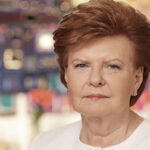Vike-Freiberga was President of Latvia from 1999 to 2007. A respected expert on security and defense issues and a convinced Europeanist, her work in her days in office was instrumental for the integration of Latvia into the European Union and NATO.
Vike-Freiberga’s predecessors were Fernando Henrique Cardoso, former President of Brazil, Ricardo Lagos, former President of Chile and Wim Kok, former Prime Minister of the Netherlands. The Club of Madrid is currently formed by 111 members, all of them former democratically elected Heads of State or government.
The Club de Madrid General Assembly also elected María Elena Agüero as the new Secretary General of the organization. She was serving as Deputy Secretary General and now she succeeds Ambassador Carlos Westendorp who worked at the Club de Madrid’s headquarters from 2010 to 2016.
Vaira Vike-Freiberga – Biography
President of Latvia (1999-2007) and current President of the Club de Madrid
Date and place of birth:
1 December 1937, Latvia.
Education:
Having left Latvia as a child refugee at the end of World War II, Vaira started schooling in a refugee camp in Germany in 1945, continued it in French Morocco, and then obtained higher education in Canada, with a B.A. and M.A. at the University of Toronto, and a Ph.D. in experimental psychology (1965) at McGill University in Montreal.
Professional Experience:
Dr. Vike-Freiberga emerged as a prominent spokesperson on politics and science whilst Professor of psychology and interdisciplinary scholar at the University of Montreal (1965-1998). She has held leading positions in national and international scientific and scholarly organisations, as well as in a number of Canadian governmental, institutional, academic and interdisciplinary committees, where she acquired extensive administrative experience. Since the beginning of her career, she has been actively engaged in community service, focusing on questions of Latvian identity and culture, and the political future of the Baltic States.
Political Career:
Dr. Vike-Freiberga returned to her native country in 1998 to head the Latvian Institute, an organization devoted to promoting Latvian awareness abroad. A year later, in June 1999, she was elected President of the Republic by the Latvian Parliament in June 1999 and re-elected in 2003. As President, she is known for her role in Latvia’s NATO membership and accession to the European Union (2004), and for raising the nation’s recognition in the world through her work at the UN, the EU and other international activities. She was named Special Envoy to the Secretary General on United Nations reform and was official candidate for UN Secretary General in 2006.
Since the end of her presidency in July 2007, Dr. Vike-Freiberga has been actively participating as an invited speaker at a wide variety of international events. She is a member, board member or patron of 29 international organisations, including the Council of Women World Leaders, the International Criminal Court Trust Fund for Victims, the European Council on Foreign Relations, the World Leadership Alliance, as well as four Academies. Among her international activities, In December 2007, she was appointed by the European Council vice-chair of the Reflection group on the long term future of Europe. In 2011-2012 she chaired the High-level group on Freedom and pluralism of the media in the EU. In 2014 she was elected president of the Club de Madrid.
Other:
Dr. Vike-Freiberga has been awarded 34 Orders of Merit (1st class) and 19 Honorary doctorates, as well as many medals, prizes and honours, for distinguished work in the humanities and social sciences, including the 2005 Hannah-Arendt Prize for political thought, the 2010 Konrad Adenauer Prize for her contribution to the political construction of a united Europe, and the 2013 Knight of Freedom award of the Casimir Pulaski Foundation.
Dr. Vike-Freiberga has published 14 books, and is the author or co-author of some 200 articles, book chapters, reports, and 12 audiovisual materials. Five biographies and three documentary films have been produced about her.


